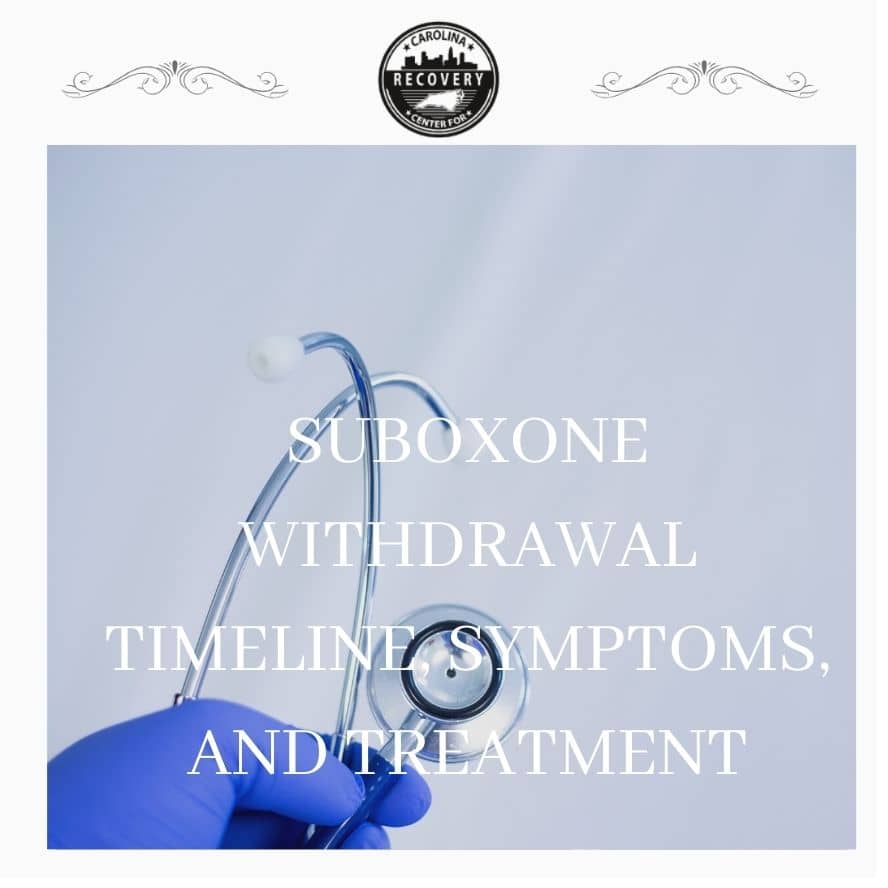Suboxone Withdrawal Timeline, Symptoms, and Treatment

Medically Verified: 2/1/24
Medical Reviewer
Chief Editor

All of the information on this page has been reviewed and verified by a certified addiction professional.
Suboxone is a medication that is used to treat opioid dependency by preventing patients from experiencing symptoms of withdrawal and cravings. This medication contains buprenorphine, a partial opioid agonist that attaches to opioid receptors in the brain. It also contains naloxone, an opioid antagonist that blocks other opioids from attaching to brain receptors.
While Suboxone is effective in treating the symptoms of opioid withdrawal and considered safer than other medication-assisted treatment (MAT) medications like methadone, it can be habit-forming. Unfortunately, people who take this medication on a long-term basis may develop a dependency on it. It is important to note that while addiction is possible, the National Institute for Drug Abuse reports that three-fourths of Suboxone patients did not misuse the drug.[1]
If you or a loved one become addicted to Suboxone, you will require a medical detox program to overcome the symptoms of withdrawal. The Suboxone withdrawal timeline can be extremely uncomfortable and even painful, making it imperative that you attend a licensed detox center.
Symptoms of Suboxone Withdrawal
If you abuse Suboxone, you can become dependent on the medication. Once your body is dependent on the substance, you will experience symptoms of withdrawal upon discontinuing your use. Because of this, it is never recommended to suddenly stop taking Suboxone without the help of a detox facility.
The symptoms of Suboxone withdrawal may include:[2]
- Nausea and vomiting
- Diarrhea
- Headaches
- Muscle aches
- Abnormalities in heart rate
- Sudden changes in body temperature
- Dehydration
- Anxiety
- Depression
- Mood swings
- Insomnia
- Cravings for opioids
While these symptoms do not seem as severe as alcohol or benzodiazepine withdrawal, dehydration can lead to life-threatening effects if not treated properly.
Suboxone Withdrawal Timeline
The exact timeline of Suboxone withdrawal depends on a variety of factors, including how long you were addicted to the substance, what dosage you were taking, and your overall health. While the length of Suboxone withdrawal varies from person to person, there is a general timeline that most individuals follow.
24 Hours
Within the first 24 hours after your last dosage of Suboxone, you will begin to notice withdrawal symptoms. The initial symptoms of withdrawal are usually not severe, but you must be under the supervision of a medical detox facility to prevent complications from occurring. You may experience symptoms of anxiety, depression, insomnia, or other sleep difficulties during the first 24 hours.
72 Hours
Sometime between 24 and 72 hours your symptoms will peak, meaning they will be at their most intense. You must be receiving treatment for Suboxone withdrawal from a medical detox facility at this stage. Some of the symptoms you can expect to experience during this time include nausea, vomiting, diarrhea, body aches, and fever.
1 Week
After the first week of withdrawal, your symptoms will begin to subside. If you continue to experience symptoms during this stage of withdrawal, they will mainly be psychological. For example, you could continue to experience anxiety, depression, or mood changes.
Thankfully, these symptoms are easily managed with medications and psychotherapy. Licensed detox centers will provide you with all of the tools and support you need to overcome Suboxone withdrawal.
2 Weeks
Most people do not experience any more symptoms after two weeks. If you are dealing with symptoms of withdrawal two weeks after your last dosage of Suboxone, you may be suffering from post-acute withdrawal syndrome (PAWS). Thankfully, PAWS can be managed with therapy, medications, and holistic treatments.
According to UCLA, 90% of recovering opioid users experience post-acute withdrawal syndrome to some degree.[3] Because this is a common issue among opioid addicts, having access to the treatment provided in a medical detox program is essential.
How is Suboxone Withdrawal Treated?
Drug and alcohol detox centers focus on treating the symptoms of withdrawal you are facing, preventing you from experiencing severe cravings, and providing you with the support you need to remain motivated in your recovery.
The services provided during detox for Suboxone include:
- An in-depth assessment of your substance abuse history
- 24/7 monitoring of vital signs, medical safety, and mental health
- Constant supervision and access to psychiatric support
- Medications to soothe symptoms of withdrawal
- Access to fluids, electrolytes, and vitamins as needed
- Daily support groups and therapy sessions
- Referrals to additional addiction treatment programs like inpatient or outpatient treatment
Suboxone is a detox medication for opioid addiction, so many programs use the tapering method to allow your body to adjust to the absence of the medication. This means that the doctors and nurses in your detox facility will slowly decrease your dosage of Suboxone over time until you are off of the medication completely. Tapering will prevent severe symptoms of withdrawal and keeps you safe throughout the process.
Get In Touch With a Suboxone Detox Center Today
If you or a loved one suffer from Suboxone addiction, it’s time to seek help. While Suboxone is an effective tool in the opioid addiction recovery process, misusing the medication can lead to dependency. A drug detox center can provide you with the treatments, tools, and support you need to overcome Suboxone addiction.
Contact Carolina Center for Recovery today to start your recovery.
References:

